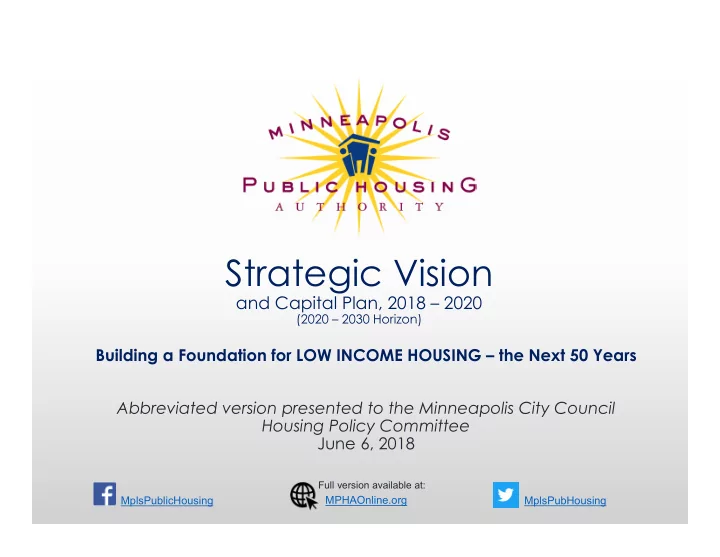

Strategic Vision and Capital Plan, 2018 – 2020 (2020 – 2030 Horizon) Building a Foundation for LOW INCOME HOUSING – the Next 50 Years Abbreviated version presented to the Minneapolis City Council Housing Policy Committee June 6, 2018 Full version available at: MplsPublicHousing MPHAOnline.org MplsPubHousing
MPHA At-a-Glance Mission To promote and deliver quality, well-managed homes to a diverse, low-income population and, with partners, contribute to the well- being of the individuals, families and community we serve. 42 ~6,000 26,000+ high-rise buildings vouchers with people 5,006 710 apartments project-based vouchers 184 746 townhomes single family homes/duplexes 2
The Capital Backlog Challenge Consistent with MPHA’s mission to provide housing for low-income families, MPHA must seek new public and private sources of funding to implement a capital plan to preserve MPHA’s low-income housing for the future. Inadequate Operating Subsidy MPHA capital needs (present course) $200 Millions and $150 Inadequate Capital Funding $100 HUD Funding $50 has led to a large $0 2018 2019 2020 2021 2022 Capital Backlog of major repair and renovation needs 3
MPHA Residents: Ongoing Input, Built-in Protections From design to implementation, MPHA works with residents and other stakeholders to address current and future residents’ needs. Property Plans Ongoing resident involvement in individual property plans Guiding Principles Design & Livability for Redevelopment Standards Relocation Rights Contract Livability committee Land Use Restriction Agreement Listening sessions Redevelopment choices always Resident support the mission Input Residents and legal services engaged in development of documents Health and Human Quality Services Maintenance New investments in health Program options and opportunities Master Planning Process Land and non-dwelling properties 4
MPHA Residents: Ongoing Input, Built-in Protections From MPHA’s “Guiding Principles for Redevelopment and Capital Investment”: • No resident will lose housing. • Rent will not go up because of redevelopment. • MPHA will continue to manage the properties. • All residents will have the first right-of-return to their site. • We will fully inform residents of any possible changes and involve them deeply in the planning process. • Residents will have choices, options, and assistance in the event of any change. These and other protections not only match our mission and values; they are required by HUD. 5
MPHA Strategic Vision As approved by the MPHA Board in May, 2018 STRATEGIC INITIATIVES Rehabilitate and add units when feasible – highrises, townhomes, scattered sites. Housing Implement Quality Maintenance Program for properties not yet Preservation undergoing capital improvements. & Creation Diversify the housing portfolio and funding sources – land, targeted use of project-based vouchers. Create new family housing linked to education and Education, employment outcomes. Employment Re-establish a resident services program. & Health Increase access to health services in MPHA properties. Increase organizational capacity and strengthen workforce Operational recruitment with focus on jobs for MPHA families. Migrate to single IT platform; improve business processes. $ Excellence Implement continuous improvement program. 6
MPHA’s Menu of Funding Options To generate the capital to preserve our public housing, MPHA must explore any and all sources of available funding. Transfers subsidy of units to a more stable source of Subsidy/Funding Conversion funding: project-based vouchers. under Rental Assistance Enables external investment to upgrade the property. Demonstration (RAD) or similar HUD program. Locks-in long-term low-income affordability (via Land Use Restriction Agreement, or LURA). Triggers Tenant Protection Vouchers, increases Transfer of Properties available subsidy per unit by a factor of three. to MPHA-controlled non-profit Locks-in long-term low-income affordability via LURA. Enables bond issuance, by using levy to service the bond obligations. Minneapolis City Tax Levy Leverage could be worth $95 million in capital funding. for Public Housing Requires long-term commitment from the city. Any debt service must be paid from subsidy & rent. Grants and loans (banks, Low-income housing is eligible for Program-Related foundations, bonding) Investments (PRI) by foundations. Energy Savings (including Savings from energy efficiency yield additional cash- “inclusive financing”) flow to invest and/or leverage. 7
Recent Highlights MPHA is moving forward wherever we can, to improve lives and plan for the future. Security investments at the Cedars Minnehaha Townhomes Sharing tools and vision with residents Ongoing collaboration with neighboring agencies Glendale weatherization 8
Recommend
More recommend